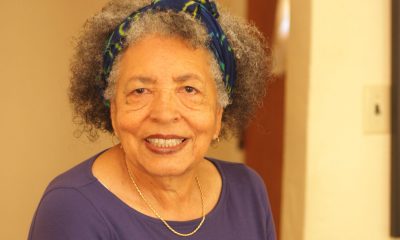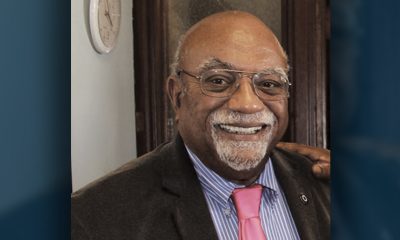Education
Dismantling Pipelines to Prison: Fresh Lifelines for Youth (FLY) Reimagines Opportunity for Young People
“Some of the greatest success stories we’ve had is with youth who have been resistant to the process and wanting support,” said Trevor Arceneaux, Associate Director of FLY’s Alameda County operations. “FLY does a really great job at building authentic and trusting relationships with youth. Seeing the change and the walls being torn down and they’re able to engage with us in a different way and let us into their lives where we can understand and learn their needs. Then, we’re able to tap into their genius and get them to operate in the community with a different way.”

Edward Henderson | Impact Alameda
The ACLU defines the school to prison pipeline as a “national trend wherein children are funneled out of public schools and into the juvenile and criminal justice systems.”
Many of the children that fall into this pipeline have learning disabilities, are victims of neglect, abuse, and would benefit from additional services.
However, too many of them have also been subjected to systematic zero-tolerance policies that criminalize minor infractions and serve as catapults, feeding more children into the pipeline to prison.
Fresh Lifelines for Youth (FLY), is an Oakland-based organization dedicated to dismantling the school to prison pipeline by equipping youth with knowledge of the law and empowering youth with a community of supporters that amplify their voices.
FLY’s mission is poetic in the sense that the voices of youth who fell victim to the prison pipeline served as the foundation for the organization’s creation.
Back in 1995, Christa Gannon, FLY’s founder and Stanford University Law School graduate, would often converse with teens facing significant prison time about services that could steer other children away from incarceration.
In many of their responses, the children mentioned education of the law — to know the consequences of poor choices – as well as having role models and opportunities to be of service to their communities. Those ideas are the pillars that FLY was built on.
“Education is power,” said Trevor Arceneaux, Associate Director of FLY’s Alameda County operations. “There are a lot of opportunities to practice that power. It helps to develop a young person’s critical consciousness of the world and how they see it. A lot of times our young people are actively in this pipeline, and they can name it and see it. We can give them options on how to solve these real-world issues.”
In 2000, FLY transitioned to a non-profit, building on the concepts of law education and empowerment. Today, FLY is now one of the Bay Area’s most respected agencies working with youth who are currently or formerly involved in the juvenile justice system.
With 70 staff and more than 200 volunteers, FLY serves more than 2,000 youth throughout the Bay Area each year, ranging from ages 11 to 24.
“Some of the greatest success stories we’ve had is with youth who have been resistant to the process and wanting support,” said Arceneaux. “FLY does a really great job at building authentic and trusting relationships with youth. Seeing the change and the walls being torn down and they’re able to engage with us in a different way and let us into their lives where we can understand and learn their needs. Then, we’re able to tap into their genius and get them to operate in the community with a different way.”
These authentic connections are fostered in the many programs FLY offers to equip youth with the knowledge and confidence they need to navigate life and avoid pitfalls.
In Alameda County FLY offers 4 core programs that provide pivotal services and education.
The Court Appointed Friend and Advocate (CAFA) Mentor Program pairs youth with mentors to meet weekly and support them in developing new behaviors, ambitions and attitudes. Each mentor/mentee pairing has a FLY case manager for support who also attends monthly group activities organized by FLY. All mentors are also granted legal standing to act as advocates for their mentees in the courtroom and at schools.
The FLY Law Program is an interactive 8-to-12-week course covering topics such as police encounters, accomplice liability, three strikes, theft, vandalism, drugs, gangs, and police arrests. The curriculum also touches on critical life skills like anger management, problem solving, conflict resolution, and resisting negative peer pressure. Mid-way through the semester, youth take a field trip to a local university law school where they tour the campus and act out a mock trial in the moot courtroom.
The Leadership Training Program helps youth build the skills and attitudes they need to live a crime-free, self-sufficient life. The program traditionally kicks off with a three-day wilderness retreat that enables youth to break away from negative influences and stresses and begin bonding with FLY staff and peers, developing trust and teamwork skills. (Because of the pandemic, virtual or socially distanced activities have replaced the retreats.) Following the retreat, youth meet monthly to support each other in group settings and to design projects in which they advocate for positive change and give back to their communities. Each young person receives intensive coaching from a FLY case manager to identify and address their greatest barriers.
The STAY FLY Program is a reentry program that develops social emotional learning skills and knowledge of the law in youth ages 18-25. A three-tier system is implemented to support youth as they transition back into the community. Law-related education, pro-social events and civic engagement activities, along with case management and coaching are offered to participants.
“Youth really love being around FLY staff,” said Arceneaux. “That’s more important to me than anything. They are going to remember the connections they have. When I see youth cracking jokes or hitting up staff to tell them about an accomplishment, that lets me know we’re doing what we’re supposed to be doing. We’re really pushing youth to use their voice. In the next three to five years, you’re going to hear about former or current FLY youth advocating or pushing for systematic change. Tapping into their sense of agency and impacting the entire world.”
-

 Business2 years ago
Business2 years agoVolunteer to V.P.: Margot Dashiell Fights for Families Dealing With Mental Illness, Trauma
-

 Resource Guide2 years ago
Resource Guide2 years agoIMPACT MEDIA | SPRING / SUMMER 2022
-

 Highlights2 years ago
Highlights2 years agoJustice = Jobs: YEP, an Oakland Org, Prepares Youth for Careers, Education Access
-

 Business2 years ago
Business2 years agoWalking by Faith, Leading with Love: Rev. Ken Chambers Invests in Alameda County
-

 Business2 years ago
Business2 years agoA Voice for Victims: Cal NAACP Is Clearing Criminal Records for Free
-

 Highlights2 years ago
Highlights2 years agoJuvenile Justice in Alameda County: We’re on Our Way but More Needs to Be Done for Our Children
-

 Business3 years ago
Business3 years agoMichala Toscas: Oakland Cannabis Kitchen
-

 Highlights2 years ago
Highlights2 years agoA Voice for Victims: Cal NAACP Is Helping to Clear Criminal Records for Free







